Detailed Reflection: Volunteering Experience and Career Goals
VerifiedAdded on 2022/08/14
|18
|5032
|35
Report
AI Summary
This report provides a comprehensive reflection on a student's volunteering experience, detailing the motivations, goals, and achieved outcomes of their involvement. The student explores the skills and knowledge gained, including class management, lesson planning, and communication abilities, referencing practical evidence such as lesson plans and supervisor statements. The report analyzes the student's engagement with UEL employability activities, highlighting the identification of skill gaps and the development of a plan for future career progression. Furthermore, it examines the student's insights into a career in the teaching sector, considering the challenges and opportunities within the field and drawing on learning diaries to support their observations. The report concludes with a synthesis of the overall learning experience and key takeaways, offering a valuable perspective on the student's professional development.
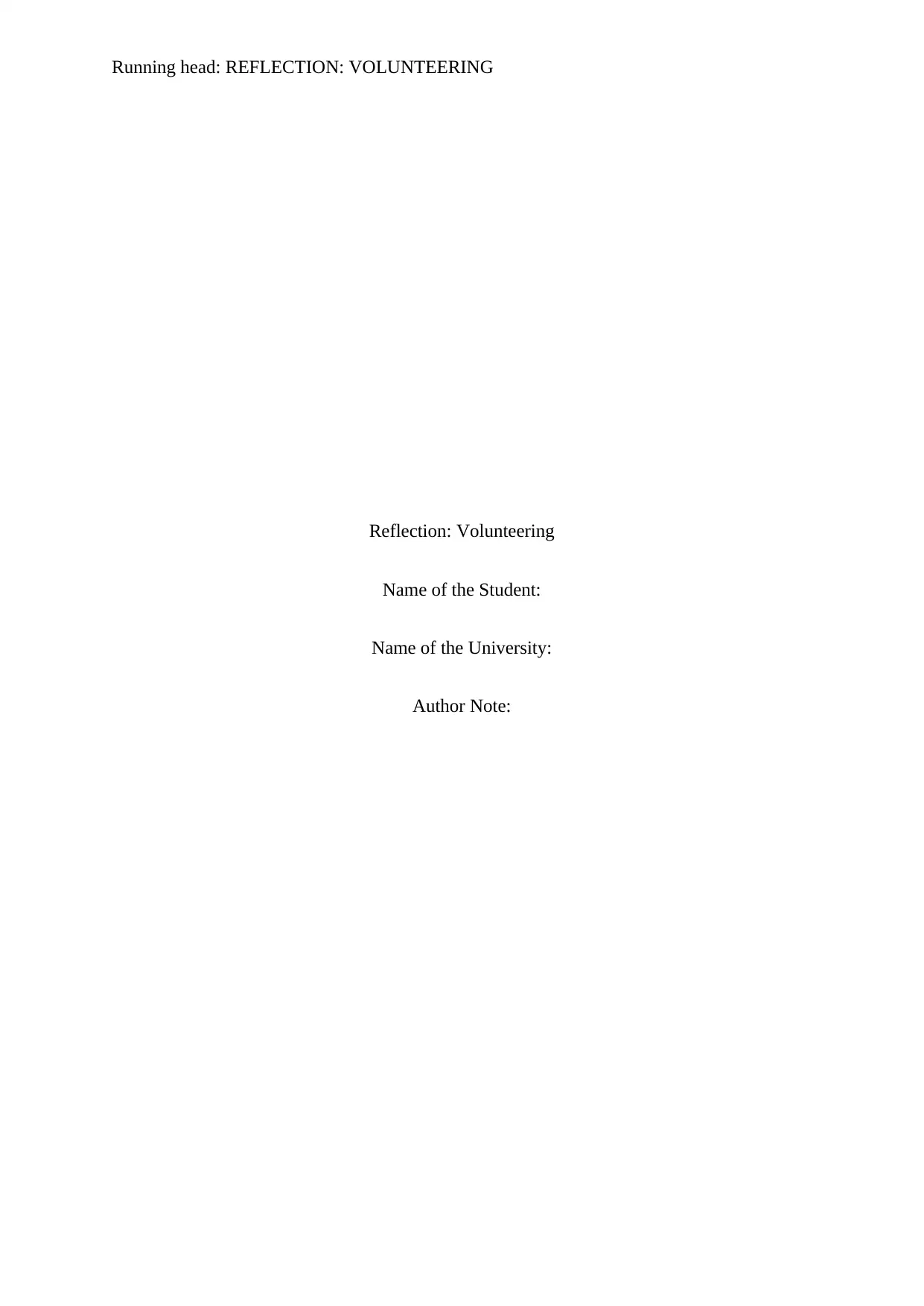
Running head: REFLECTION: VOLUNTEERING
Reflection: Volunteering
Name of the Student:
Name of the University:
Author Note:
Reflection: Volunteering
Name of the Student:
Name of the University:
Author Note:
Paraphrase This Document
Need a fresh take? Get an instant paraphrase of this document with our AI Paraphraser
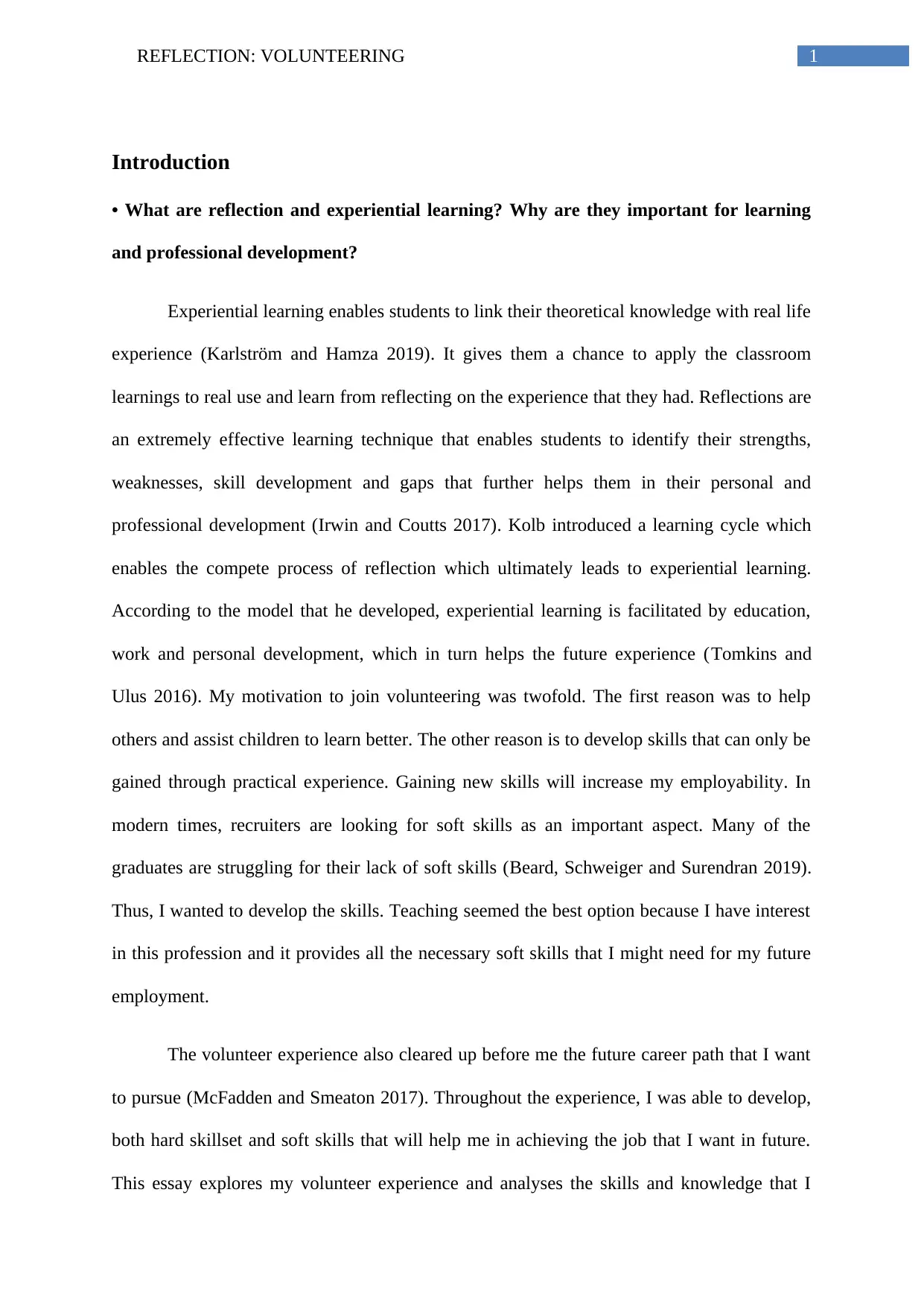
1REFLECTION: VOLUNTEERING
Introduction
• What are reflection and experiential learning? Why are they important for learning
and professional development?
Experiential learning enables students to link their theoretical knowledge with real life
experience (Karlström and Hamza 2019). It gives them a chance to apply the classroom
learnings to real use and learn from reflecting on the experience that they had. Reflections are
an extremely effective learning technique that enables students to identify their strengths,
weaknesses, skill development and gaps that further helps them in their personal and
professional development (Irwin and Coutts 2017). Kolb introduced a learning cycle which
enables the compete process of reflection which ultimately leads to experiential learning.
According to the model that he developed, experiential learning is facilitated by education,
work and personal development, which in turn helps the future experience (Tomkins and
Ulus 2016). My motivation to join volunteering was twofold. The first reason was to help
others and assist children to learn better. The other reason is to develop skills that can only be
gained through practical experience. Gaining new skills will increase my employability. In
modern times, recruiters are looking for soft skills as an important aspect. Many of the
graduates are struggling for their lack of soft skills (Beard, Schweiger and Surendran 2019).
Thus, I wanted to develop the skills. Teaching seemed the best option because I have interest
in this profession and it provides all the necessary soft skills that I might need for my future
employment.
The volunteer experience also cleared up before me the future career path that I want
to pursue (McFadden and Smeaton 2017). Throughout the experience, I was able to develop,
both hard skillset and soft skills that will help me in achieving the job that I want in future.
This essay explores my volunteer experience and analyses the skills and knowledge that I
Introduction
• What are reflection and experiential learning? Why are they important for learning
and professional development?
Experiential learning enables students to link their theoretical knowledge with real life
experience (Karlström and Hamza 2019). It gives them a chance to apply the classroom
learnings to real use and learn from reflecting on the experience that they had. Reflections are
an extremely effective learning technique that enables students to identify their strengths,
weaknesses, skill development and gaps that further helps them in their personal and
professional development (Irwin and Coutts 2017). Kolb introduced a learning cycle which
enables the compete process of reflection which ultimately leads to experiential learning.
According to the model that he developed, experiential learning is facilitated by education,
work and personal development, which in turn helps the future experience (Tomkins and
Ulus 2016). My motivation to join volunteering was twofold. The first reason was to help
others and assist children to learn better. The other reason is to develop skills that can only be
gained through practical experience. Gaining new skills will increase my employability. In
modern times, recruiters are looking for soft skills as an important aspect. Many of the
graduates are struggling for their lack of soft skills (Beard, Schweiger and Surendran 2019).
Thus, I wanted to develop the skills. Teaching seemed the best option because I have interest
in this profession and it provides all the necessary soft skills that I might need for my future
employment.
The volunteer experience also cleared up before me the future career path that I want
to pursue (McFadden and Smeaton 2017). Throughout the experience, I was able to develop,
both hard skillset and soft skills that will help me in achieving the job that I want in future.
This essay explores my volunteer experience and analyses the skills and knowledge that I
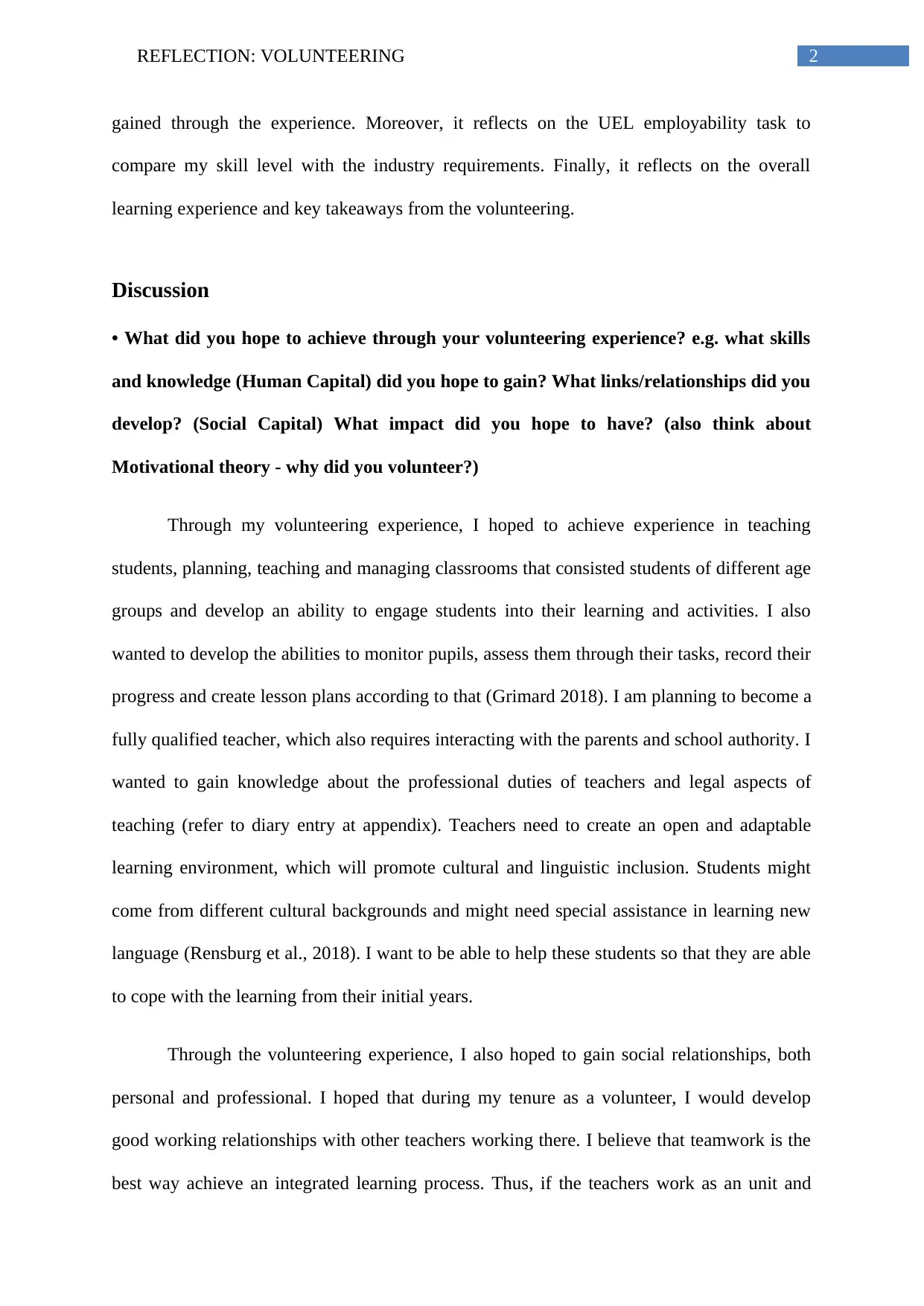
2REFLECTION: VOLUNTEERING
gained through the experience. Moreover, it reflects on the UEL employability task to
compare my skill level with the industry requirements. Finally, it reflects on the overall
learning experience and key takeaways from the volunteering.
Discussion
• What did you hope to achieve through your volunteering experience? e.g. what skills
and knowledge (Human Capital) did you hope to gain? What links/relationships did you
develop? (Social Capital) What impact did you hope to have? (also think about
Motivational theory - why did you volunteer?)
Through my volunteering experience, I hoped to achieve experience in teaching
students, planning, teaching and managing classrooms that consisted students of different age
groups and develop an ability to engage students into their learning and activities. I also
wanted to develop the abilities to monitor pupils, assess them through their tasks, record their
progress and create lesson plans according to that (Grimard 2018). I am planning to become a
fully qualified teacher, which also requires interacting with the parents and school authority. I
wanted to gain knowledge about the professional duties of teachers and legal aspects of
teaching (refer to diary entry at appendix). Teachers need to create an open and adaptable
learning environment, which will promote cultural and linguistic inclusion. Students might
come from different cultural backgrounds and might need special assistance in learning new
language (Rensburg et al., 2018). I want to be able to help these students so that they are able
to cope with the learning from their initial years.
Through the volunteering experience, I also hoped to gain social relationships, both
personal and professional. I hoped that during my tenure as a volunteer, I would develop
good working relationships with other teachers working there. I believe that teamwork is the
best way achieve an integrated learning process. Thus, if the teachers work as an unit and
gained through the experience. Moreover, it reflects on the UEL employability task to
compare my skill level with the industry requirements. Finally, it reflects on the overall
learning experience and key takeaways from the volunteering.
Discussion
• What did you hope to achieve through your volunteering experience? e.g. what skills
and knowledge (Human Capital) did you hope to gain? What links/relationships did you
develop? (Social Capital) What impact did you hope to have? (also think about
Motivational theory - why did you volunteer?)
Through my volunteering experience, I hoped to achieve experience in teaching
students, planning, teaching and managing classrooms that consisted students of different age
groups and develop an ability to engage students into their learning and activities. I also
wanted to develop the abilities to monitor pupils, assess them through their tasks, record their
progress and create lesson plans according to that (Grimard 2018). I am planning to become a
fully qualified teacher, which also requires interacting with the parents and school authority. I
wanted to gain knowledge about the professional duties of teachers and legal aspects of
teaching (refer to diary entry at appendix). Teachers need to create an open and adaptable
learning environment, which will promote cultural and linguistic inclusion. Students might
come from different cultural backgrounds and might need special assistance in learning new
language (Rensburg et al., 2018). I want to be able to help these students so that they are able
to cope with the learning from their initial years.
Through the volunteering experience, I also hoped to gain social relationships, both
personal and professional. I hoped that during my tenure as a volunteer, I would develop
good working relationships with other teachers working there. I believe that teamwork is the
best way achieve an integrated learning process. Thus, if the teachers work as an unit and
⊘ This is a preview!⊘
Do you want full access?
Subscribe today to unlock all pages.

Trusted by 1+ million students worldwide
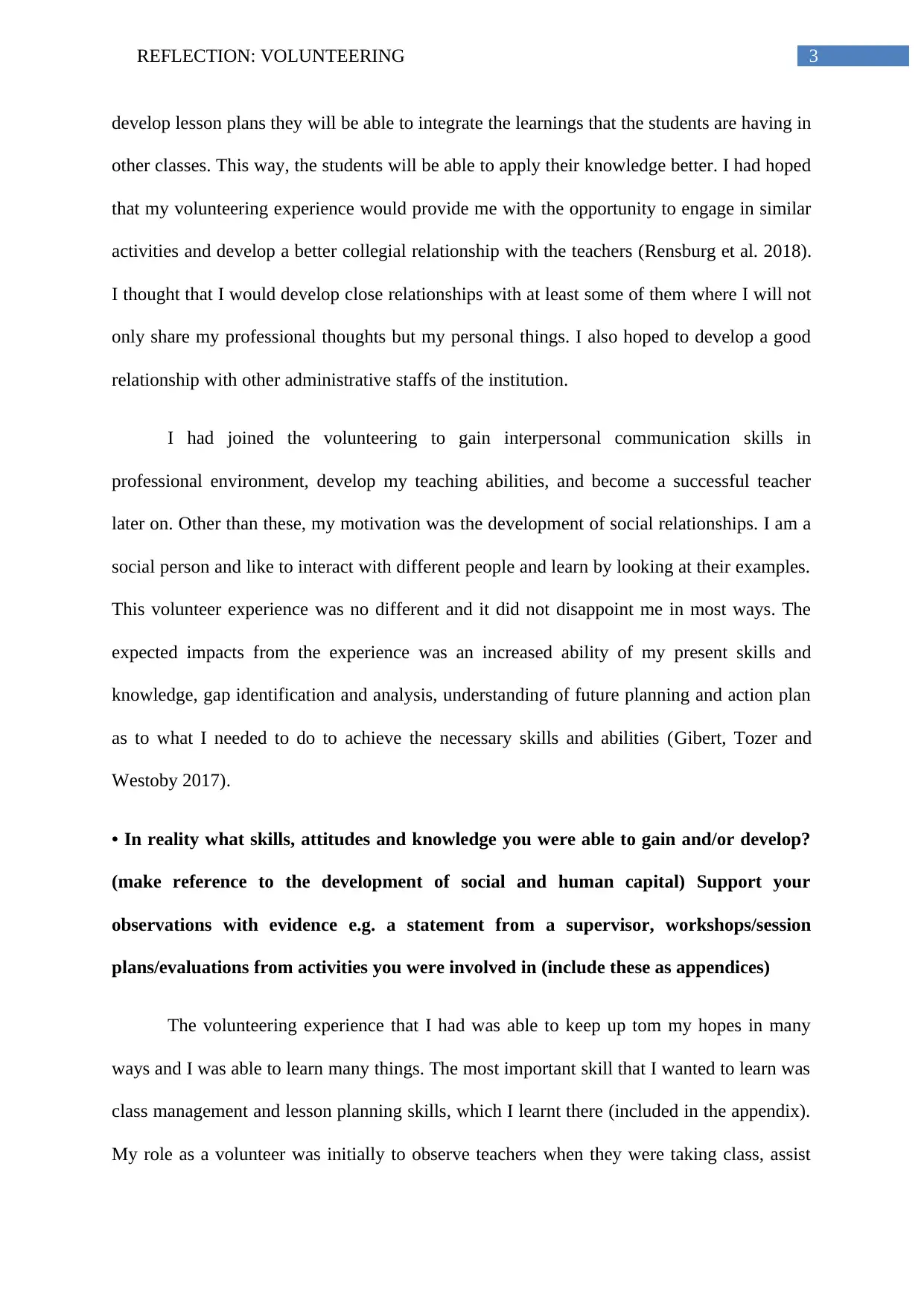
3REFLECTION: VOLUNTEERING
develop lesson plans they will be able to integrate the learnings that the students are having in
other classes. This way, the students will be able to apply their knowledge better. I had hoped
that my volunteering experience would provide me with the opportunity to engage in similar
activities and develop a better collegial relationship with the teachers (Rensburg et al. 2018).
I thought that I would develop close relationships with at least some of them where I will not
only share my professional thoughts but my personal things. I also hoped to develop a good
relationship with other administrative staffs of the institution.
I had joined the volunteering to gain interpersonal communication skills in
professional environment, develop my teaching abilities, and become a successful teacher
later on. Other than these, my motivation was the development of social relationships. I am a
social person and like to interact with different people and learn by looking at their examples.
This volunteer experience was no different and it did not disappoint me in most ways. The
expected impacts from the experience was an increased ability of my present skills and
knowledge, gap identification and analysis, understanding of future planning and action plan
as to what I needed to do to achieve the necessary skills and abilities (Gibert, Tozer and
Westoby 2017).
• In reality what skills, attitudes and knowledge you were able to gain and/or develop?
(make reference to the development of social and human capital) Support your
observations with evidence e.g. a statement from a supervisor, workshops/session
plans/evaluations from activities you were involved in (include these as appendices)
The volunteering experience that I had was able to keep up tom my hopes in many
ways and I was able to learn many things. The most important skill that I wanted to learn was
class management and lesson planning skills, which I learnt there (included in the appendix).
My role as a volunteer was initially to observe teachers when they were taking class, assist
develop lesson plans they will be able to integrate the learnings that the students are having in
other classes. This way, the students will be able to apply their knowledge better. I had hoped
that my volunteering experience would provide me with the opportunity to engage in similar
activities and develop a better collegial relationship with the teachers (Rensburg et al. 2018).
I thought that I would develop close relationships with at least some of them where I will not
only share my professional thoughts but my personal things. I also hoped to develop a good
relationship with other administrative staffs of the institution.
I had joined the volunteering to gain interpersonal communication skills in
professional environment, develop my teaching abilities, and become a successful teacher
later on. Other than these, my motivation was the development of social relationships. I am a
social person and like to interact with different people and learn by looking at their examples.
This volunteer experience was no different and it did not disappoint me in most ways. The
expected impacts from the experience was an increased ability of my present skills and
knowledge, gap identification and analysis, understanding of future planning and action plan
as to what I needed to do to achieve the necessary skills and abilities (Gibert, Tozer and
Westoby 2017).
• In reality what skills, attitudes and knowledge you were able to gain and/or develop?
(make reference to the development of social and human capital) Support your
observations with evidence e.g. a statement from a supervisor, workshops/session
plans/evaluations from activities you were involved in (include these as appendices)
The volunteering experience that I had was able to keep up tom my hopes in many
ways and I was able to learn many things. The most important skill that I wanted to learn was
class management and lesson planning skills, which I learnt there (included in the appendix).
My role as a volunteer was initially to observe teachers when they were taking class, assist
Paraphrase This Document
Need a fresh take? Get an instant paraphrase of this document with our AI Paraphraser
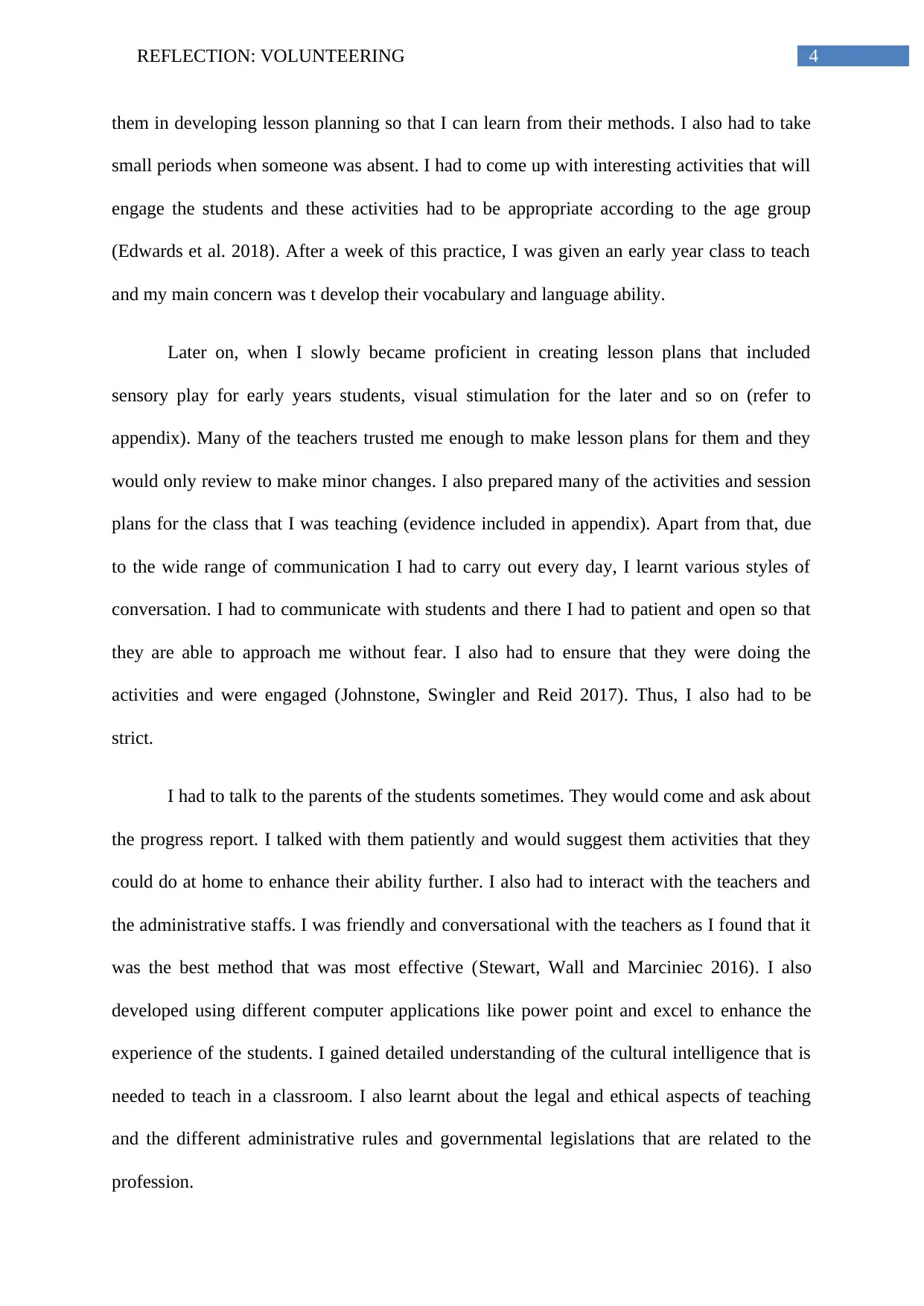
4REFLECTION: VOLUNTEERING
them in developing lesson planning so that I can learn from their methods. I also had to take
small periods when someone was absent. I had to come up with interesting activities that will
engage the students and these activities had to be appropriate according to the age group
(Edwards et al. 2018). After a week of this practice, I was given an early year class to teach
and my main concern was t develop their vocabulary and language ability.
Later on, when I slowly became proficient in creating lesson plans that included
sensory play for early years students, visual stimulation for the later and so on (refer to
appendix). Many of the teachers trusted me enough to make lesson plans for them and they
would only review to make minor changes. I also prepared many of the activities and session
plans for the class that I was teaching (evidence included in appendix). Apart from that, due
to the wide range of communication I had to carry out every day, I learnt various styles of
conversation. I had to communicate with students and there I had to patient and open so that
they are able to approach me without fear. I also had to ensure that they were doing the
activities and were engaged (Johnstone, Swingler and Reid 2017). Thus, I also had to be
strict.
I had to talk to the parents of the students sometimes. They would come and ask about
the progress report. I talked with them patiently and would suggest them activities that they
could do at home to enhance their ability further. I also had to interact with the teachers and
the administrative staffs. I was friendly and conversational with the teachers as I found that it
was the best method that was most effective (Stewart, Wall and Marciniec 2016). I also
developed using different computer applications like power point and excel to enhance the
experience of the students. I gained detailed understanding of the cultural intelligence that is
needed to teach in a classroom. I also learnt about the legal and ethical aspects of teaching
and the different administrative rules and governmental legislations that are related to the
profession.
them in developing lesson planning so that I can learn from their methods. I also had to take
small periods when someone was absent. I had to come up with interesting activities that will
engage the students and these activities had to be appropriate according to the age group
(Edwards et al. 2018). After a week of this practice, I was given an early year class to teach
and my main concern was t develop their vocabulary and language ability.
Later on, when I slowly became proficient in creating lesson plans that included
sensory play for early years students, visual stimulation for the later and so on (refer to
appendix). Many of the teachers trusted me enough to make lesson plans for them and they
would only review to make minor changes. I also prepared many of the activities and session
plans for the class that I was teaching (evidence included in appendix). Apart from that, due
to the wide range of communication I had to carry out every day, I learnt various styles of
conversation. I had to communicate with students and there I had to patient and open so that
they are able to approach me without fear. I also had to ensure that they were doing the
activities and were engaged (Johnstone, Swingler and Reid 2017). Thus, I also had to be
strict.
I had to talk to the parents of the students sometimes. They would come and ask about
the progress report. I talked with them patiently and would suggest them activities that they
could do at home to enhance their ability further. I also had to interact with the teachers and
the administrative staffs. I was friendly and conversational with the teachers as I found that it
was the best method that was most effective (Stewart, Wall and Marciniec 2016). I also
developed using different computer applications like power point and excel to enhance the
experience of the students. I gained detailed understanding of the cultural intelligence that is
needed to teach in a classroom. I also learnt about the legal and ethical aspects of teaching
and the different administrative rules and governmental legislations that are related to the
profession.
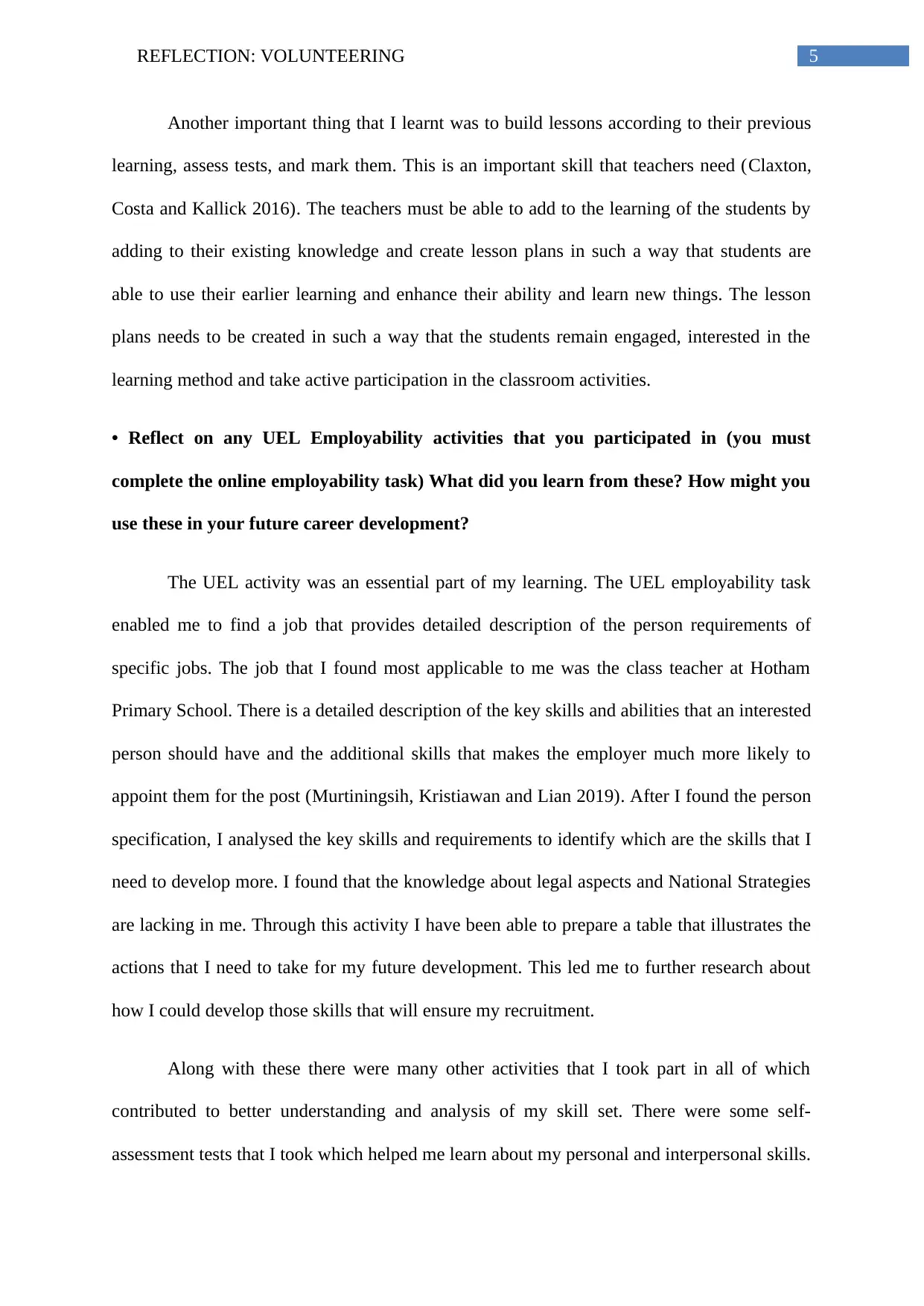
5REFLECTION: VOLUNTEERING
Another important thing that I learnt was to build lessons according to their previous
learning, assess tests, and mark them. This is an important skill that teachers need (Claxton,
Costa and Kallick 2016). The teachers must be able to add to the learning of the students by
adding to their existing knowledge and create lesson plans in such a way that students are
able to use their earlier learning and enhance their ability and learn new things. The lesson
plans needs to be created in such a way that the students remain engaged, interested in the
learning method and take active participation in the classroom activities.
• Reflect on any UEL Employability activities that you participated in (you must
complete the online employability task) What did you learn from these? How might you
use these in your future career development?
The UEL activity was an essential part of my learning. The UEL employability task
enabled me to find a job that provides detailed description of the person requirements of
specific jobs. The job that I found most applicable to me was the class teacher at Hotham
Primary School. There is a detailed description of the key skills and abilities that an interested
person should have and the additional skills that makes the employer much more likely to
appoint them for the post (Murtiningsih, Kristiawan and Lian 2019). After I found the person
specification, I analysed the key skills and requirements to identify which are the skills that I
need to develop more. I found that the knowledge about legal aspects and National Strategies
are lacking in me. Through this activity I have been able to prepare a table that illustrates the
actions that I need to take for my future development. This led me to further research about
how I could develop those skills that will ensure my recruitment.
Along with these there were many other activities that I took part in all of which
contributed to better understanding and analysis of my skill set. There were some self-
assessment tests that I took which helped me learn about my personal and interpersonal skills.
Another important thing that I learnt was to build lessons according to their previous
learning, assess tests, and mark them. This is an important skill that teachers need (Claxton,
Costa and Kallick 2016). The teachers must be able to add to the learning of the students by
adding to their existing knowledge and create lesson plans in such a way that students are
able to use their earlier learning and enhance their ability and learn new things. The lesson
plans needs to be created in such a way that the students remain engaged, interested in the
learning method and take active participation in the classroom activities.
• Reflect on any UEL Employability activities that you participated in (you must
complete the online employability task) What did you learn from these? How might you
use these in your future career development?
The UEL activity was an essential part of my learning. The UEL employability task
enabled me to find a job that provides detailed description of the person requirements of
specific jobs. The job that I found most applicable to me was the class teacher at Hotham
Primary School. There is a detailed description of the key skills and abilities that an interested
person should have and the additional skills that makes the employer much more likely to
appoint them for the post (Murtiningsih, Kristiawan and Lian 2019). After I found the person
specification, I analysed the key skills and requirements to identify which are the skills that I
need to develop more. I found that the knowledge about legal aspects and National Strategies
are lacking in me. Through this activity I have been able to prepare a table that illustrates the
actions that I need to take for my future development. This led me to further research about
how I could develop those skills that will ensure my recruitment.
Along with these there were many other activities that I took part in all of which
contributed to better understanding and analysis of my skill set. There were some self-
assessment tests that I took which helped me learn about my personal and interpersonal skills.
⊘ This is a preview!⊘
Do you want full access?
Subscribe today to unlock all pages.

Trusted by 1+ million students worldwide
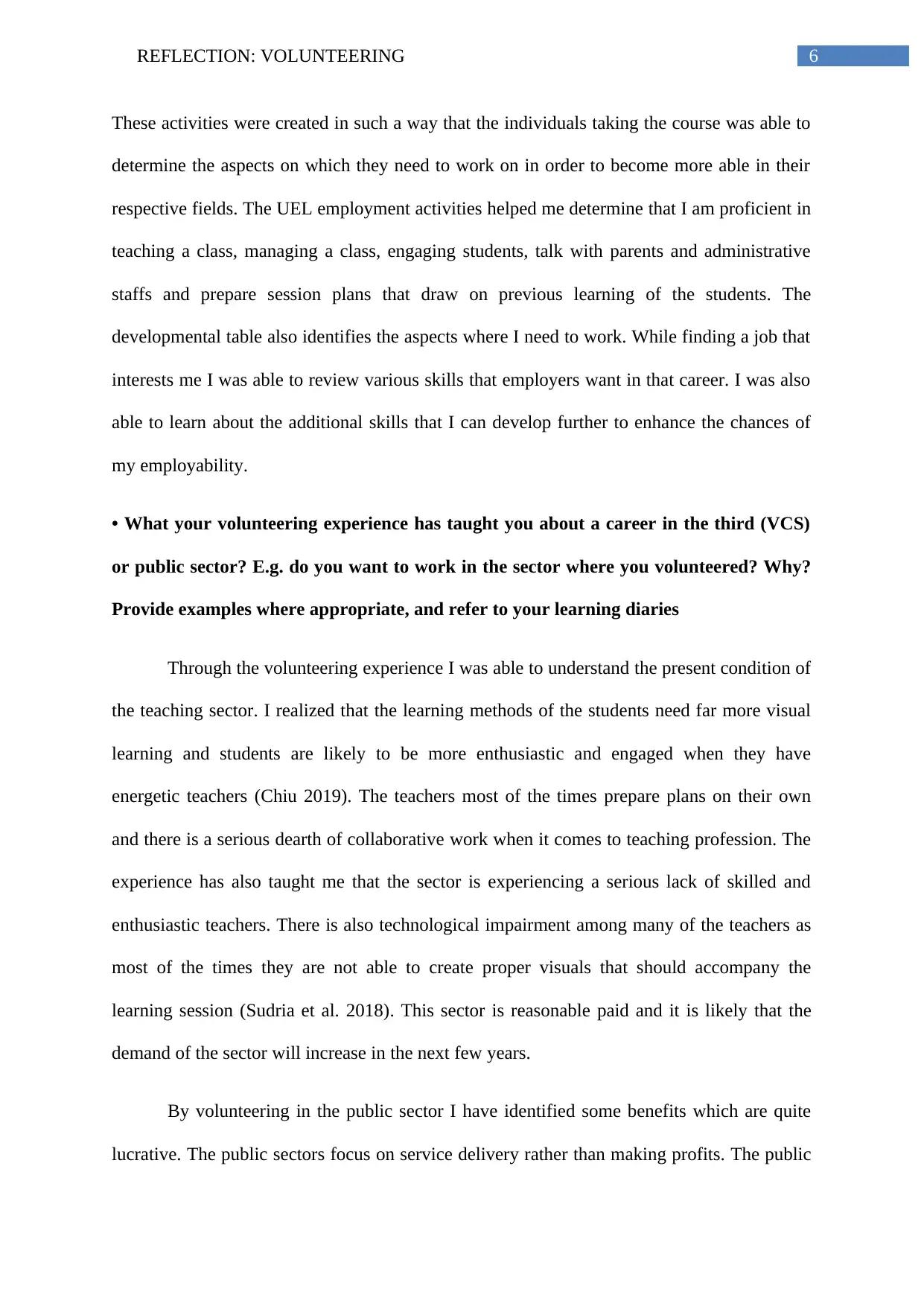
6REFLECTION: VOLUNTEERING
These activities were created in such a way that the individuals taking the course was able to
determine the aspects on which they need to work on in order to become more able in their
respective fields. The UEL employment activities helped me determine that I am proficient in
teaching a class, managing a class, engaging students, talk with parents and administrative
staffs and prepare session plans that draw on previous learning of the students. The
developmental table also identifies the aspects where I need to work. While finding a job that
interests me I was able to review various skills that employers want in that career. I was also
able to learn about the additional skills that I can develop further to enhance the chances of
my employability.
• What your volunteering experience has taught you about a career in the third (VCS)
or public sector? E.g. do you want to work in the sector where you volunteered? Why?
Provide examples where appropriate, and refer to your learning diaries
Through the volunteering experience I was able to understand the present condition of
the teaching sector. I realized that the learning methods of the students need far more visual
learning and students are likely to be more enthusiastic and engaged when they have
energetic teachers (Chiu 2019). The teachers most of the times prepare plans on their own
and there is a serious dearth of collaborative work when it comes to teaching profession. The
experience has also taught me that the sector is experiencing a serious lack of skilled and
enthusiastic teachers. There is also technological impairment among many of the teachers as
most of the times they are not able to create proper visuals that should accompany the
learning session (Sudria et al. 2018). This sector is reasonable paid and it is likely that the
demand of the sector will increase in the next few years.
By volunteering in the public sector I have identified some benefits which are quite
lucrative. The public sectors focus on service delivery rather than making profits. The public
These activities were created in such a way that the individuals taking the course was able to
determine the aspects on which they need to work on in order to become more able in their
respective fields. The UEL employment activities helped me determine that I am proficient in
teaching a class, managing a class, engaging students, talk with parents and administrative
staffs and prepare session plans that draw on previous learning of the students. The
developmental table also identifies the aspects where I need to work. While finding a job that
interests me I was able to review various skills that employers want in that career. I was also
able to learn about the additional skills that I can develop further to enhance the chances of
my employability.
• What your volunteering experience has taught you about a career in the third (VCS)
or public sector? E.g. do you want to work in the sector where you volunteered? Why?
Provide examples where appropriate, and refer to your learning diaries
Through the volunteering experience I was able to understand the present condition of
the teaching sector. I realized that the learning methods of the students need far more visual
learning and students are likely to be more enthusiastic and engaged when they have
energetic teachers (Chiu 2019). The teachers most of the times prepare plans on their own
and there is a serious dearth of collaborative work when it comes to teaching profession. The
experience has also taught me that the sector is experiencing a serious lack of skilled and
enthusiastic teachers. There is also technological impairment among many of the teachers as
most of the times they are not able to create proper visuals that should accompany the
learning session (Sudria et al. 2018). This sector is reasonable paid and it is likely that the
demand of the sector will increase in the next few years.
By volunteering in the public sector I have identified some benefits which are quite
lucrative. The public sectors focus on service delivery rather than making profits. The public
Paraphrase This Document
Need a fresh take? Get an instant paraphrase of this document with our AI Paraphraser
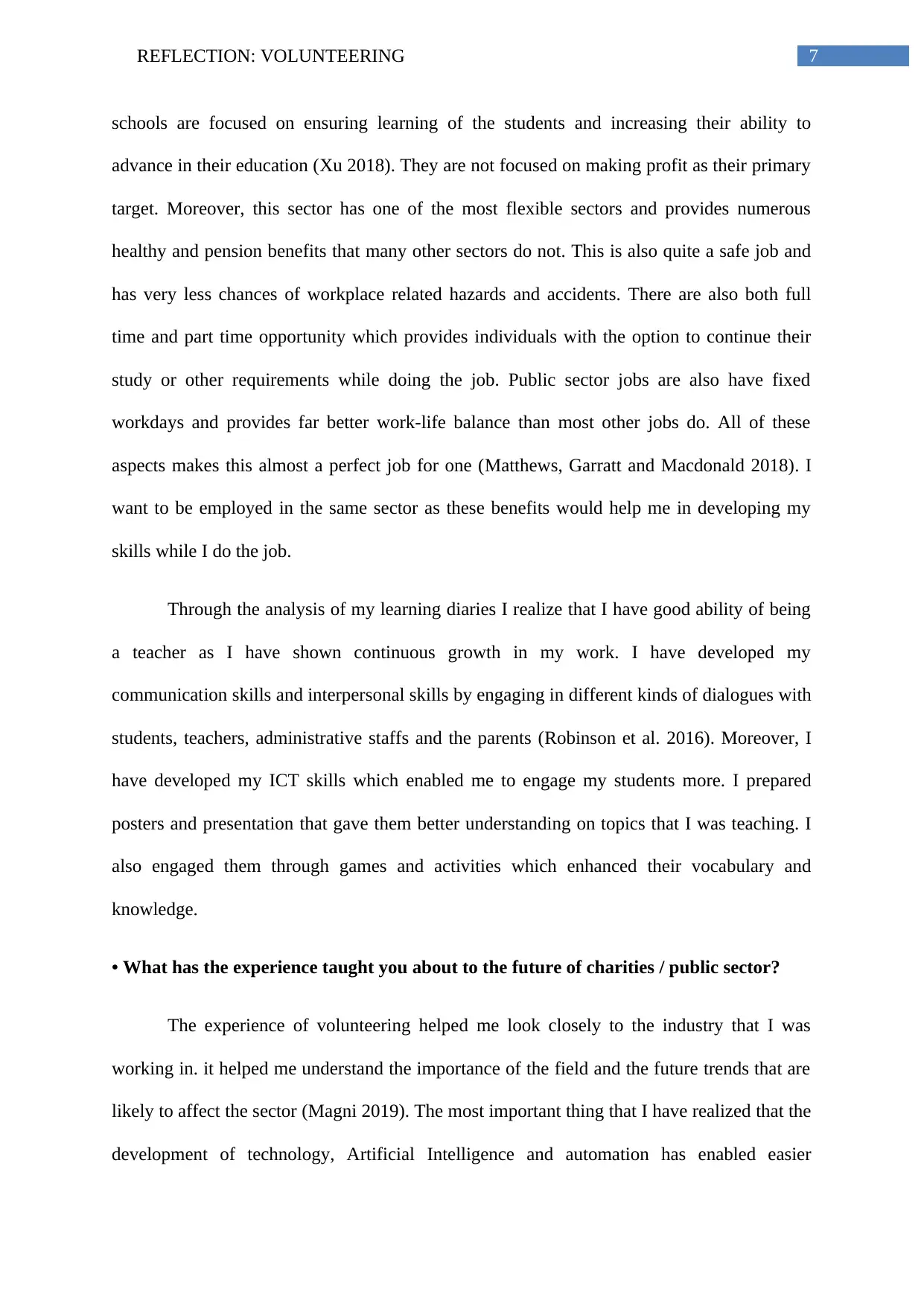
7REFLECTION: VOLUNTEERING
schools are focused on ensuring learning of the students and increasing their ability to
advance in their education (Xu 2018). They are not focused on making profit as their primary
target. Moreover, this sector has one of the most flexible sectors and provides numerous
healthy and pension benefits that many other sectors do not. This is also quite a safe job and
has very less chances of workplace related hazards and accidents. There are also both full
time and part time opportunity which provides individuals with the option to continue their
study or other requirements while doing the job. Public sector jobs are also have fixed
workdays and provides far better work-life balance than most other jobs do. All of these
aspects makes this almost a perfect job for one (Matthews, Garratt and Macdonald 2018). I
want to be employed in the same sector as these benefits would help me in developing my
skills while I do the job.
Through the analysis of my learning diaries I realize that I have good ability of being
a teacher as I have shown continuous growth in my work. I have developed my
communication skills and interpersonal skills by engaging in different kinds of dialogues with
students, teachers, administrative staffs and the parents (Robinson et al. 2016). Moreover, I
have developed my ICT skills which enabled me to engage my students more. I prepared
posters and presentation that gave them better understanding on topics that I was teaching. I
also engaged them through games and activities which enhanced their vocabulary and
knowledge.
• What has the experience taught you about to the future of charities / public sector?
The experience of volunteering helped me look closely to the industry that I was
working in. it helped me understand the importance of the field and the future trends that are
likely to affect the sector (Magni 2019). The most important thing that I have realized that the
development of technology, Artificial Intelligence and automation has enabled easier
schools are focused on ensuring learning of the students and increasing their ability to
advance in their education (Xu 2018). They are not focused on making profit as their primary
target. Moreover, this sector has one of the most flexible sectors and provides numerous
healthy and pension benefits that many other sectors do not. This is also quite a safe job and
has very less chances of workplace related hazards and accidents. There are also both full
time and part time opportunity which provides individuals with the option to continue their
study or other requirements while doing the job. Public sector jobs are also have fixed
workdays and provides far better work-life balance than most other jobs do. All of these
aspects makes this almost a perfect job for one (Matthews, Garratt and Macdonald 2018). I
want to be employed in the same sector as these benefits would help me in developing my
skills while I do the job.
Through the analysis of my learning diaries I realize that I have good ability of being
a teacher as I have shown continuous growth in my work. I have developed my
communication skills and interpersonal skills by engaging in different kinds of dialogues with
students, teachers, administrative staffs and the parents (Robinson et al. 2016). Moreover, I
have developed my ICT skills which enabled me to engage my students more. I prepared
posters and presentation that gave them better understanding on topics that I was teaching. I
also engaged them through games and activities which enhanced their vocabulary and
knowledge.
• What has the experience taught you about to the future of charities / public sector?
The experience of volunteering helped me look closely to the industry that I was
working in. it helped me understand the importance of the field and the future trends that are
likely to affect the sector (Magni 2019). The most important thing that I have realized that the
development of technology, Artificial Intelligence and automation has enabled easier
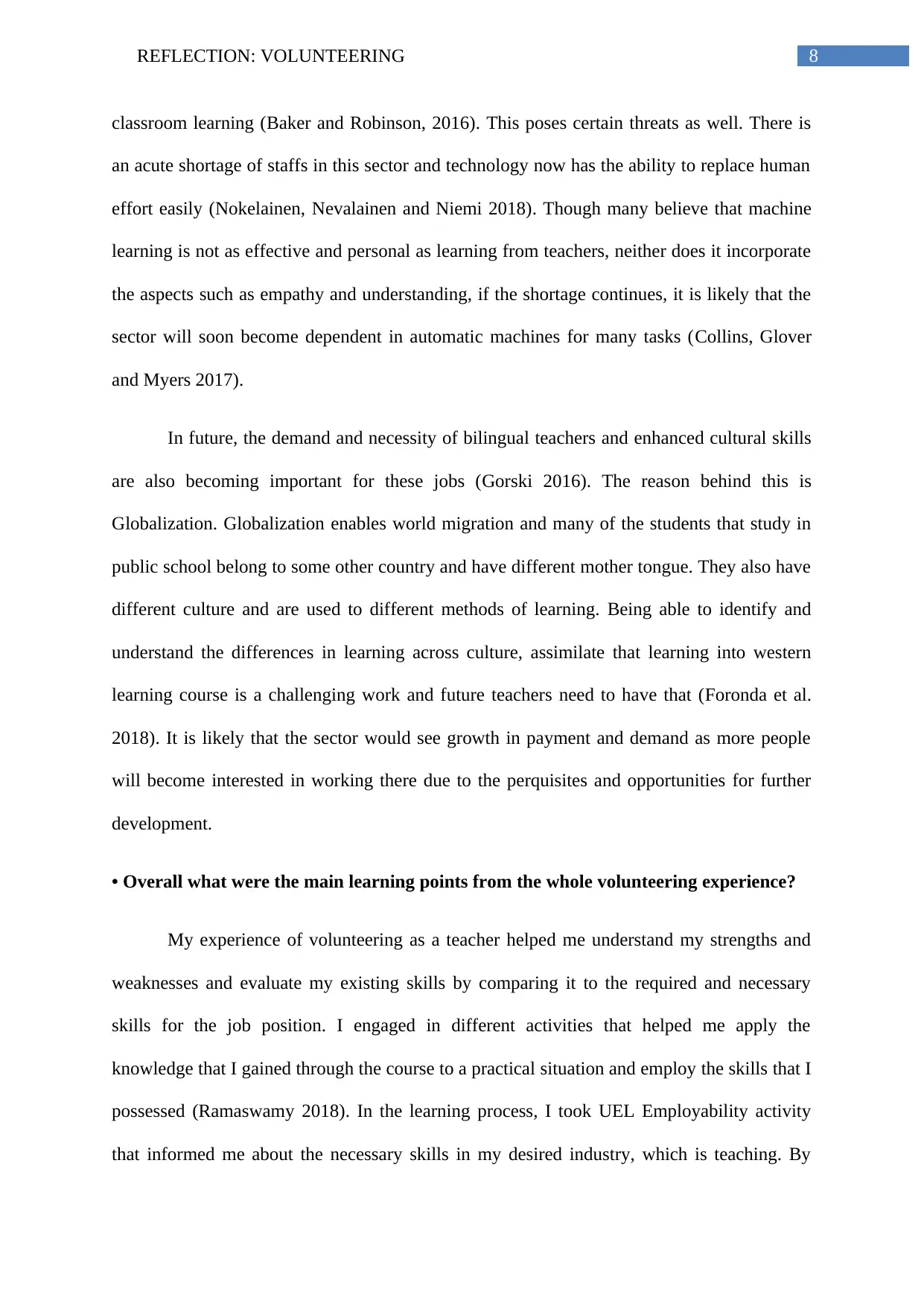
8REFLECTION: VOLUNTEERING
classroom learning (Baker and Robinson, 2016). This poses certain threats as well. There is
an acute shortage of staffs in this sector and technology now has the ability to replace human
effort easily (Nokelainen, Nevalainen and Niemi 2018). Though many believe that machine
learning is not as effective and personal as learning from teachers, neither does it incorporate
the aspects such as empathy and understanding, if the shortage continues, it is likely that the
sector will soon become dependent in automatic machines for many tasks (Collins, Glover
and Myers 2017).
In future, the demand and necessity of bilingual teachers and enhanced cultural skills
are also becoming important for these jobs (Gorski 2016). The reason behind this is
Globalization. Globalization enables world migration and many of the students that study in
public school belong to some other country and have different mother tongue. They also have
different culture and are used to different methods of learning. Being able to identify and
understand the differences in learning across culture, assimilate that learning into western
learning course is a challenging work and future teachers need to have that (Foronda et al.
2018). It is likely that the sector would see growth in payment and demand as more people
will become interested in working there due to the perquisites and opportunities for further
development.
• Overall what were the main learning points from the whole volunteering experience?
My experience of volunteering as a teacher helped me understand my strengths and
weaknesses and evaluate my existing skills by comparing it to the required and necessary
skills for the job position. I engaged in different activities that helped me apply the
knowledge that I gained through the course to a practical situation and employ the skills that I
possessed (Ramaswamy 2018). In the learning process, I took UEL Employability activity
that informed me about the necessary skills in my desired industry, which is teaching. By
classroom learning (Baker and Robinson, 2016). This poses certain threats as well. There is
an acute shortage of staffs in this sector and technology now has the ability to replace human
effort easily (Nokelainen, Nevalainen and Niemi 2018). Though many believe that machine
learning is not as effective and personal as learning from teachers, neither does it incorporate
the aspects such as empathy and understanding, if the shortage continues, it is likely that the
sector will soon become dependent in automatic machines for many tasks (Collins, Glover
and Myers 2017).
In future, the demand and necessity of bilingual teachers and enhanced cultural skills
are also becoming important for these jobs (Gorski 2016). The reason behind this is
Globalization. Globalization enables world migration and many of the students that study in
public school belong to some other country and have different mother tongue. They also have
different culture and are used to different methods of learning. Being able to identify and
understand the differences in learning across culture, assimilate that learning into western
learning course is a challenging work and future teachers need to have that (Foronda et al.
2018). It is likely that the sector would see growth in payment and demand as more people
will become interested in working there due to the perquisites and opportunities for further
development.
• Overall what were the main learning points from the whole volunteering experience?
My experience of volunteering as a teacher helped me understand my strengths and
weaknesses and evaluate my existing skills by comparing it to the required and necessary
skills for the job position. I engaged in different activities that helped me apply the
knowledge that I gained through the course to a practical situation and employ the skills that I
possessed (Ramaswamy 2018). In the learning process, I took UEL Employability activity
that informed me about the necessary skills in my desired industry, which is teaching. By
⊘ This is a preview!⊘
Do you want full access?
Subscribe today to unlock all pages.

Trusted by 1+ million students worldwide
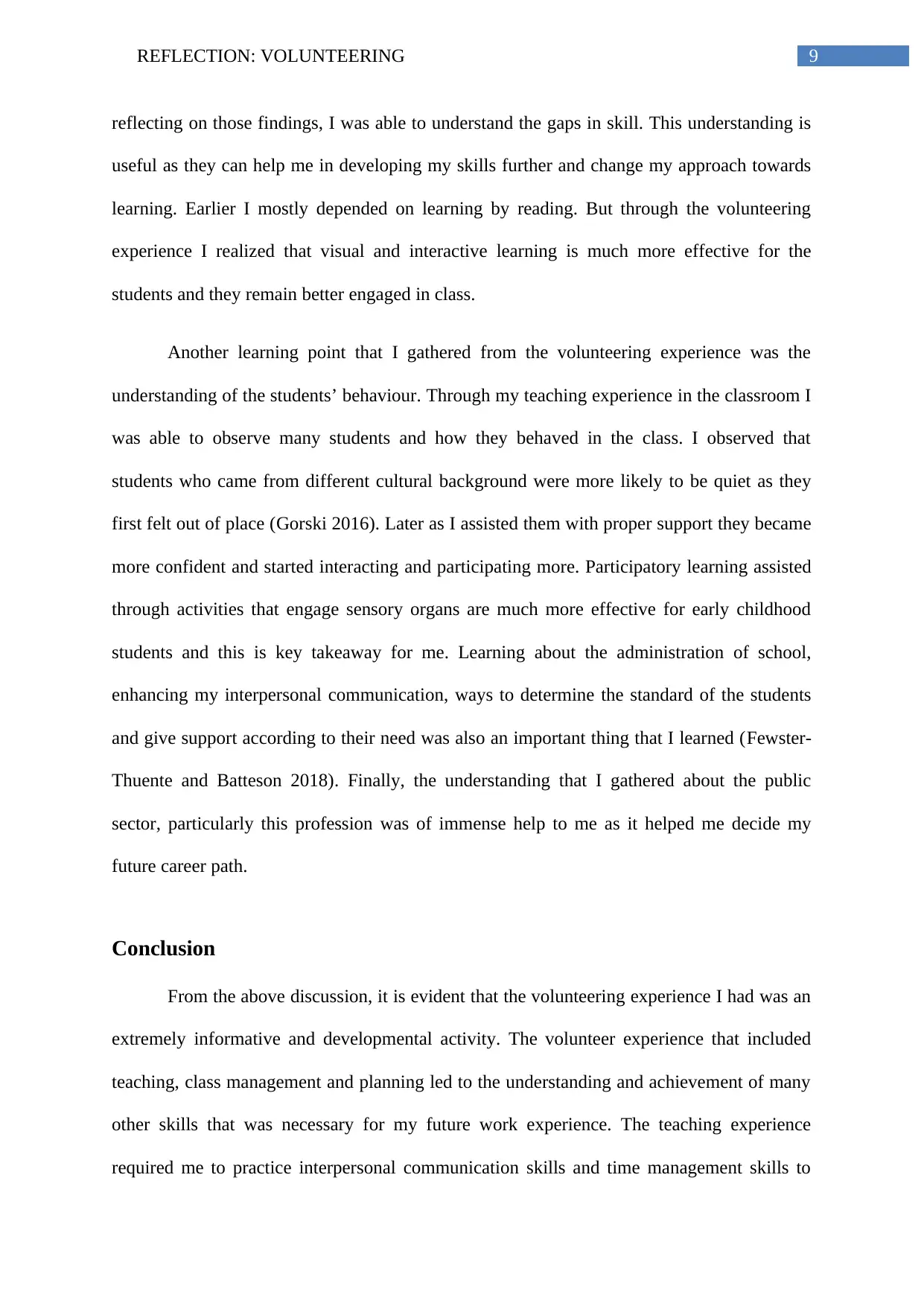
9REFLECTION: VOLUNTEERING
reflecting on those findings, I was able to understand the gaps in skill. This understanding is
useful as they can help me in developing my skills further and change my approach towards
learning. Earlier I mostly depended on learning by reading. But through the volunteering
experience I realized that visual and interactive learning is much more effective for the
students and they remain better engaged in class.
Another learning point that I gathered from the volunteering experience was the
understanding of the students’ behaviour. Through my teaching experience in the classroom I
was able to observe many students and how they behaved in the class. I observed that
students who came from different cultural background were more likely to be quiet as they
first felt out of place (Gorski 2016). Later as I assisted them with proper support they became
more confident and started interacting and participating more. Participatory learning assisted
through activities that engage sensory organs are much more effective for early childhood
students and this is key takeaway for me. Learning about the administration of school,
enhancing my interpersonal communication, ways to determine the standard of the students
and give support according to their need was also an important thing that I learned (Fewster-
Thuente and Batteson 2018). Finally, the understanding that I gathered about the public
sector, particularly this profession was of immense help to me as it helped me decide my
future career path.
Conclusion
From the above discussion, it is evident that the volunteering experience I had was an
extremely informative and developmental activity. The volunteer experience that included
teaching, class management and planning led to the understanding and achievement of many
other skills that was necessary for my future work experience. The teaching experience
required me to practice interpersonal communication skills and time management skills to
reflecting on those findings, I was able to understand the gaps in skill. This understanding is
useful as they can help me in developing my skills further and change my approach towards
learning. Earlier I mostly depended on learning by reading. But through the volunteering
experience I realized that visual and interactive learning is much more effective for the
students and they remain better engaged in class.
Another learning point that I gathered from the volunteering experience was the
understanding of the students’ behaviour. Through my teaching experience in the classroom I
was able to observe many students and how they behaved in the class. I observed that
students who came from different cultural background were more likely to be quiet as they
first felt out of place (Gorski 2016). Later as I assisted them with proper support they became
more confident and started interacting and participating more. Participatory learning assisted
through activities that engage sensory organs are much more effective for early childhood
students and this is key takeaway for me. Learning about the administration of school,
enhancing my interpersonal communication, ways to determine the standard of the students
and give support according to their need was also an important thing that I learned (Fewster-
Thuente and Batteson 2018). Finally, the understanding that I gathered about the public
sector, particularly this profession was of immense help to me as it helped me decide my
future career path.
Conclusion
From the above discussion, it is evident that the volunteering experience I had was an
extremely informative and developmental activity. The volunteer experience that included
teaching, class management and planning led to the understanding and achievement of many
other skills that was necessary for my future work experience. The teaching experience
required me to practice interpersonal communication skills and time management skills to
Paraphrase This Document
Need a fresh take? Get an instant paraphrase of this document with our AI Paraphraser
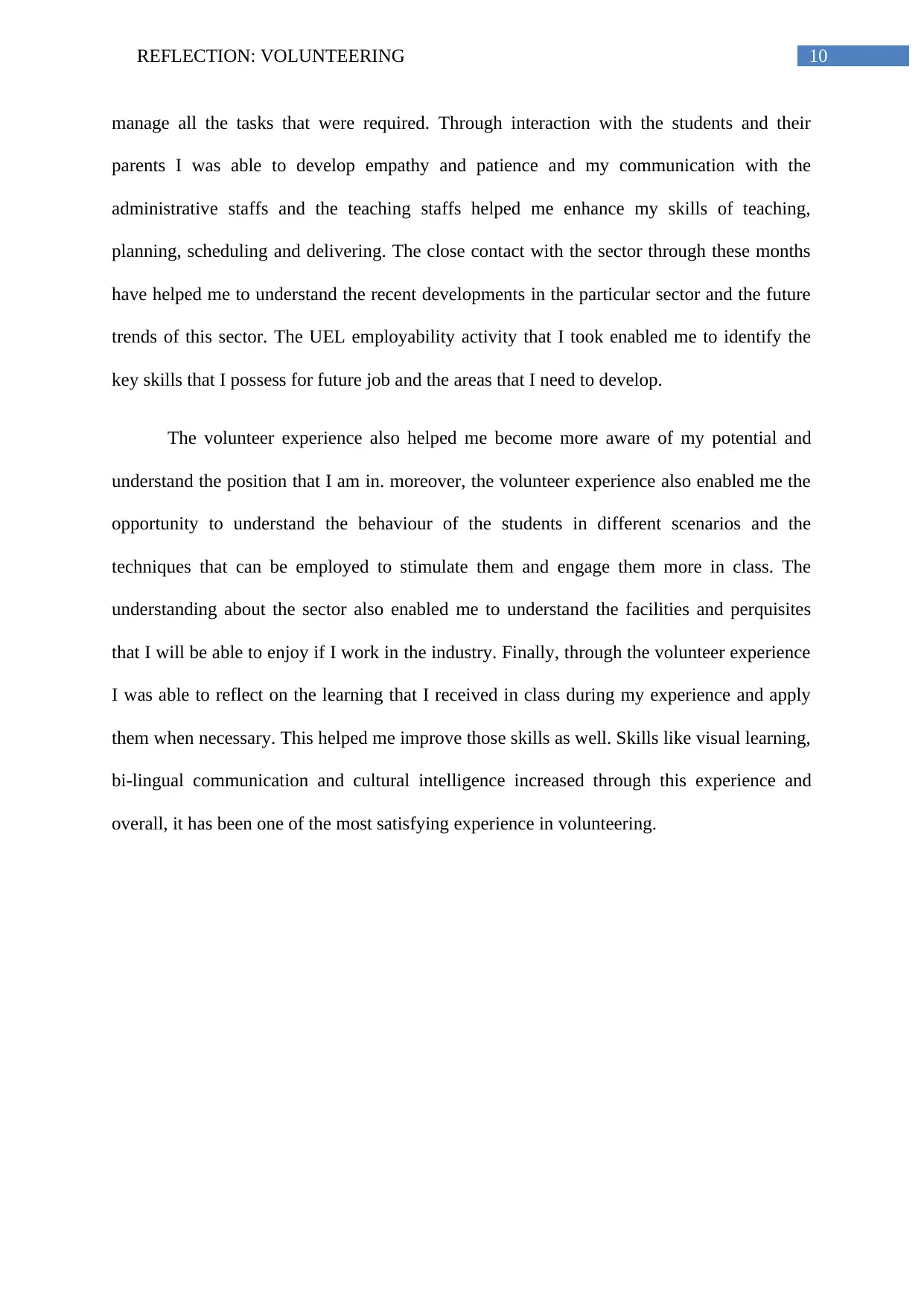
10REFLECTION: VOLUNTEERING
manage all the tasks that were required. Through interaction with the students and their
parents I was able to develop empathy and patience and my communication with the
administrative staffs and the teaching staffs helped me enhance my skills of teaching,
planning, scheduling and delivering. The close contact with the sector through these months
have helped me to understand the recent developments in the particular sector and the future
trends of this sector. The UEL employability activity that I took enabled me to identify the
key skills that I possess for future job and the areas that I need to develop.
The volunteer experience also helped me become more aware of my potential and
understand the position that I am in. moreover, the volunteer experience also enabled me the
opportunity to understand the behaviour of the students in different scenarios and the
techniques that can be employed to stimulate them and engage them more in class. The
understanding about the sector also enabled me to understand the facilities and perquisites
that I will be able to enjoy if I work in the industry. Finally, through the volunteer experience
I was able to reflect on the learning that I received in class during my experience and apply
them when necessary. This helped me improve those skills as well. Skills like visual learning,
bi-lingual communication and cultural intelligence increased through this experience and
overall, it has been one of the most satisfying experience in volunteering.
manage all the tasks that were required. Through interaction with the students and their
parents I was able to develop empathy and patience and my communication with the
administrative staffs and the teaching staffs helped me enhance my skills of teaching,
planning, scheduling and delivering. The close contact with the sector through these months
have helped me to understand the recent developments in the particular sector and the future
trends of this sector. The UEL employability activity that I took enabled me to identify the
key skills that I possess for future job and the areas that I need to develop.
The volunteer experience also helped me become more aware of my potential and
understand the position that I am in. moreover, the volunteer experience also enabled me the
opportunity to understand the behaviour of the students in different scenarios and the
techniques that can be employed to stimulate them and engage them more in class. The
understanding about the sector also enabled me to understand the facilities and perquisites
that I will be able to enjoy if I work in the industry. Finally, through the volunteer experience
I was able to reflect on the learning that I received in class during my experience and apply
them when necessary. This helped me improve those skills as well. Skills like visual learning,
bi-lingual communication and cultural intelligence increased through this experience and
overall, it has been one of the most satisfying experience in volunteering.
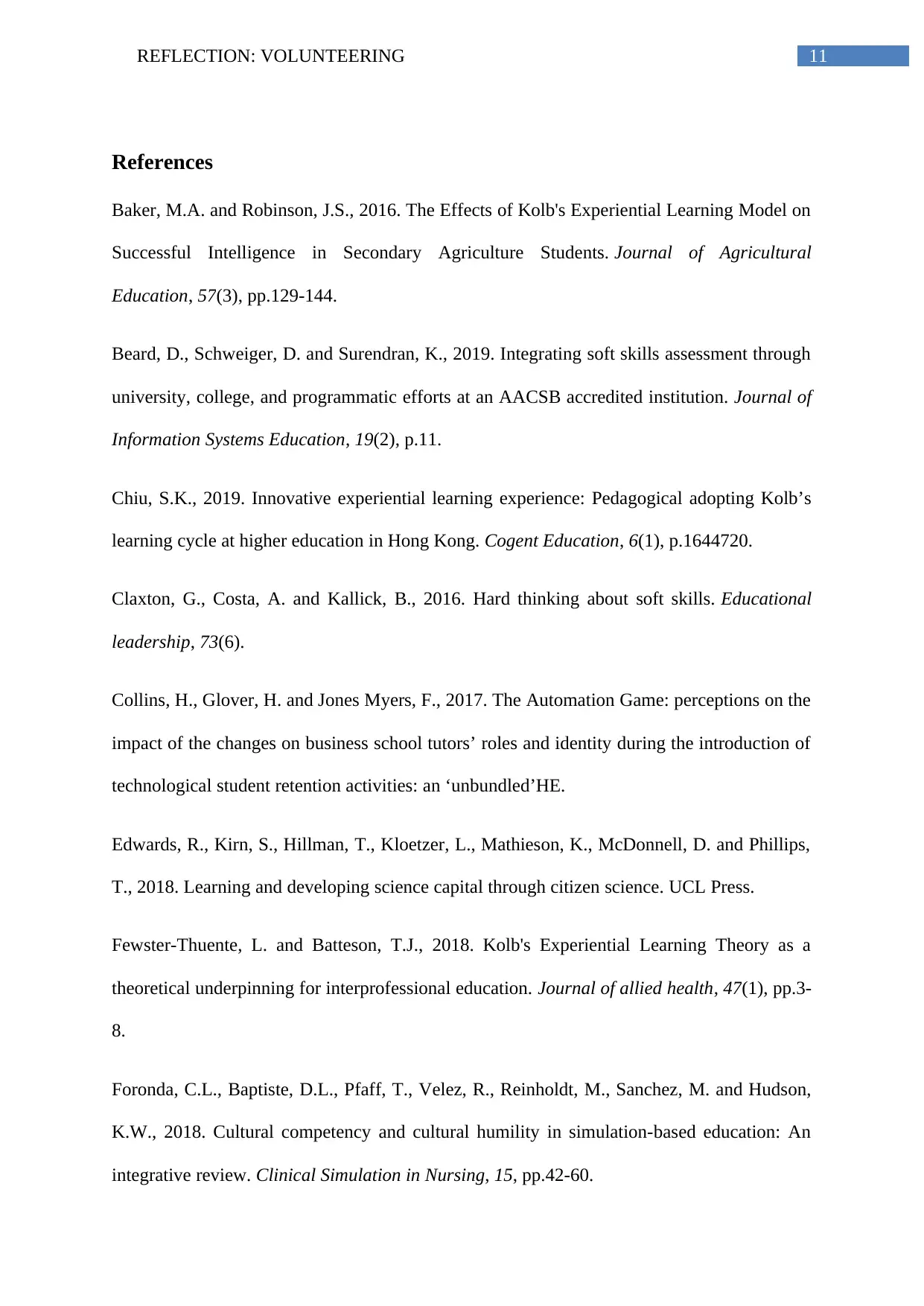
11REFLECTION: VOLUNTEERING
References
Baker, M.A. and Robinson, J.S., 2016. The Effects of Kolb's Experiential Learning Model on
Successful Intelligence in Secondary Agriculture Students. Journal of Agricultural
Education, 57(3), pp.129-144.
Beard, D., Schweiger, D. and Surendran, K., 2019. Integrating soft skills assessment through
university, college, and programmatic efforts at an AACSB accredited institution. Journal of
Information Systems Education, 19(2), p.11.
Chiu, S.K., 2019. Innovative experiential learning experience: Pedagogical adopting Kolb’s
learning cycle at higher education in Hong Kong. Cogent Education, 6(1), p.1644720.
Claxton, G., Costa, A. and Kallick, B., 2016. Hard thinking about soft skills. Educational
leadership, 73(6).
Collins, H., Glover, H. and Jones Myers, F., 2017. The Automation Game: perceptions on the
impact of the changes on business school tutors’ roles and identity during the introduction of
technological student retention activities: an ‘unbundled’HE.
Edwards, R., Kirn, S., Hillman, T., Kloetzer, L., Mathieson, K., McDonnell, D. and Phillips,
T., 2018. Learning and developing science capital through citizen science. UCL Press.
Fewster-Thuente, L. and Batteson, T.J., 2018. Kolb's Experiential Learning Theory as a
theoretical underpinning for interprofessional education. Journal of allied health, 47(1), pp.3-
8.
Foronda, C.L., Baptiste, D.L., Pfaff, T., Velez, R., Reinholdt, M., Sanchez, M. and Hudson,
K.W., 2018. Cultural competency and cultural humility in simulation-based education: An
integrative review. Clinical Simulation in Nursing, 15, pp.42-60.
References
Baker, M.A. and Robinson, J.S., 2016. The Effects of Kolb's Experiential Learning Model on
Successful Intelligence in Secondary Agriculture Students. Journal of Agricultural
Education, 57(3), pp.129-144.
Beard, D., Schweiger, D. and Surendran, K., 2019. Integrating soft skills assessment through
university, college, and programmatic efforts at an AACSB accredited institution. Journal of
Information Systems Education, 19(2), p.11.
Chiu, S.K., 2019. Innovative experiential learning experience: Pedagogical adopting Kolb’s
learning cycle at higher education in Hong Kong. Cogent Education, 6(1), p.1644720.
Claxton, G., Costa, A. and Kallick, B., 2016. Hard thinking about soft skills. Educational
leadership, 73(6).
Collins, H., Glover, H. and Jones Myers, F., 2017. The Automation Game: perceptions on the
impact of the changes on business school tutors’ roles and identity during the introduction of
technological student retention activities: an ‘unbundled’HE.
Edwards, R., Kirn, S., Hillman, T., Kloetzer, L., Mathieson, K., McDonnell, D. and Phillips,
T., 2018. Learning and developing science capital through citizen science. UCL Press.
Fewster-Thuente, L. and Batteson, T.J., 2018. Kolb's Experiential Learning Theory as a
theoretical underpinning for interprofessional education. Journal of allied health, 47(1), pp.3-
8.
Foronda, C.L., Baptiste, D.L., Pfaff, T., Velez, R., Reinholdt, M., Sanchez, M. and Hudson,
K.W., 2018. Cultural competency and cultural humility in simulation-based education: An
integrative review. Clinical Simulation in Nursing, 15, pp.42-60.
⊘ This is a preview!⊘
Do you want full access?
Subscribe today to unlock all pages.

Trusted by 1+ million students worldwide
1 out of 18
Related Documents
Your All-in-One AI-Powered Toolkit for Academic Success.
+13062052269
info@desklib.com
Available 24*7 on WhatsApp / Email
![[object Object]](/_next/static/media/star-bottom.7253800d.svg)
Unlock your academic potential
Copyright © 2020–2026 A2Z Services. All Rights Reserved. Developed and managed by ZUCOL.





